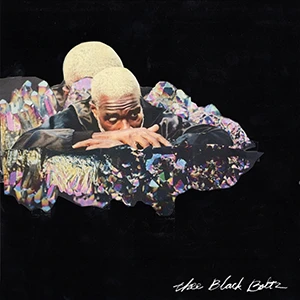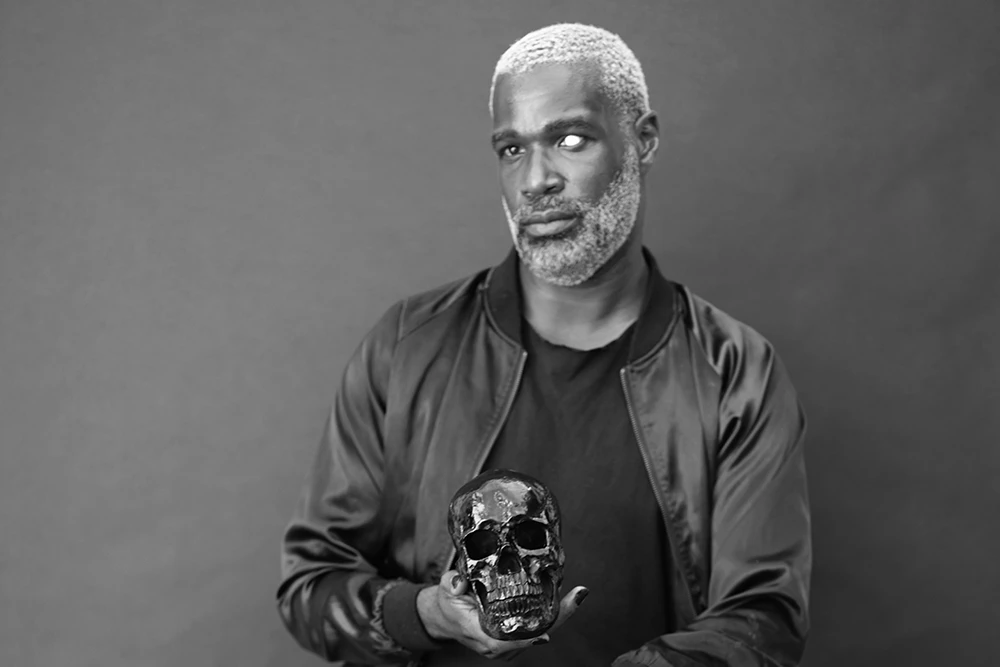
While still discovering his individual identity, TV on the Radio frontman Tunde Adebimpe offers plenty to consider about the human condition along the way.
 Thee Black Boltz Tunde Adebimpe Sub Pop 18 April 2025
Thee Black Boltz Tunde Adebimpe Sub Pop 18 April 2025
Tunde Adebimpe is best known for his work with TV on the Radio, a band he co-founded and serves as co-vocalist and principal songwriter. TV on the Radio are distinguishable from their indie rock peers, not just because the members are mostly Black, but due to the creative energy they bring to the process. Even if there is something distinctly New York about them, like echoes of a cappella heard on a row house porch stoop, they integrate universal qualities that extend beyond their urban surroundings.
Their plasticity allows Adebimpe to shine on his own because he is really an artist in the truest sense of the word. Creativity pours through him, whether that be as a musician, actor (Star Wars: Skeleton Crew, Rachel Getting Married, Twisters), animator, director, or visual artist (A Warm Weather Ghost, Plague Hero). Instead of TV on the Radio’s grand scale—bringing a range of possibilities that can be visualized as much as heard (hence the name)—Adebimpe channels that free-flowing energy into comic strip form. It ends up being a welcome offering from a singular voice in indie rock.

Tunde Adebimpe envisioned the album in 2019 and developed it over time, putting ideas down in 2021 with help from multi-instrumentalist Wilder Zoby. He eventually signed to Sub Pop in 2024. The core of the record was created coming out of the pandemic, so he seems deeply concerned with the current state of being. The introduction guides us on what to do when things get dark: settle our hate and love affairs, then sit down to reflect in nature. If only it could be so simple.
The frenzied pace of the lead single, “Magnetic”, finds the singer internalizing conflicting messages about human capability. Either it’s time to fly or get back to fundamentals, as he highlights on the bridge. Over notes from what sounds like a toy keyboard, Adebimpe sings “Get down to basics / We’re gonna crash your matrix / And whatcha gonna do about that? / Gonna get all y’all outta my life.”
Elsewhere, he challenges listeners to gain some perspective. “Drop” features a distinctly TV on the Radio beat box, as Adebimpe envisions his life as just a speck in the grand scale. However, there is a need to find a common connection, with support from others, that leads to a deeper understanding than any in the world. “ILY” also deals with mortality (“Tell me friend / That the end is not the end”). With a simple beat and fingerstyle acoustic guitar, Adebimpe’s confessional tone could be mistaken for Murray Lightburn from the Dears, with the lasting sentiment that, in the end, love will prevail.
Some of the best tracks, like the haunting “Pinstick” and soul-meets-synth “The Most”, would fit nicely on a TV on the Radio record. However, without the full complement of musicians and vocal trade-off with Kyp Malone, Adebimpe’s compositions are more streamlined and flirt with familiar styles.
The New Wave “Somebody New” is catchy but by no means groundbreaking, like the New Order flavor that inspired it. “At The Moon” has Peter Gabriel qualities but seems overly involved, especially with the integration of sounds already explored by Portugal, The Man. Considering the breadth of influences, less is more, as found on the magnificent “God Knows”, with its low-pitched piano, pedal steel guitar, and a beat that could be mistaken for Broken Bells.
Adebimpe and the musicians surrounding him offer plenty of quality on Thee Black Boltz, even if it seems as if he is still searching for his solo identity. There is no telling if he has more in store or if this is just another artistic outlet to bide his time while the band plan for their long-awaited release (now extending beyond a decade).
The artistic vision rendered here, scenes about the human condition, spark with awe-inspiring energy, not unlike the lightning imagery referenced throughout the work. Even if the concept becomes a little unwieldy, when Tunde Adebimpe’s ideas are fully formed, his rare talent comes into sharp focus and can be captivating if not altogether breathtaking.


